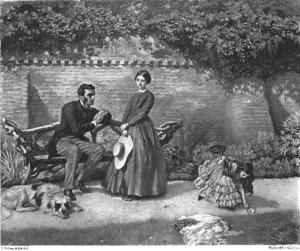 Tomorrow a daughter will marry.
Tomorrow a daughter will marry.
She chose wisely, reflecting a young life spent reading good books, attending the liturgy, and working hard. She matured, in the words of Jane Eyre ” into an independent woman.” This is just what a parent hopes happens when God grants you first the duty of raising a child and later the blessing of seeing them go. As a parent, you wane, while the child waxes into an adult. There is joy in seeing the extended family grow as two families, once separate, come together: more relatives!
“Letting Go”
Language is imprecise. When we talk about people, especially those we love, language can never fully capture them, us, or our feelings. We need a variety of images as too much use of one image, or icon, of that relationship can distort. With children, there is truth in the image of “letting them go.”
Parenting is, for a time, the center of the life of the parent and the child. Slowly, that role changes, or should change. This is the proper letting go: “birds must fly or they wouldn’t have wings.” That image must be balanced with another truth: no soul ever can belong to anyone but God. He allows each of us to be regent of our souls, splendidly free to choose. We can even vow service to someone else! This glorious truth, we are caretakers of our equals when they are young, is built into the entire Christian message.
We do not (as parents) “let go” in the sense of giving something that was once our own and giving it freedom. Growing up is not emancipation,* but a growth into the full exercise of personhood.
This day, this wedding between two souls, is particularly worthy of celebration, because these are adults. When disorder in the cosmos presented hard choices, they chose wisely. They are patient, kind, orthodox, philosophical, fun. One cannot let such souls “go” (in one sense!), because they have gone! By their own free will, they have honored truth, goodness, and beauty, by growing into splendid adulthood. They are now the next generation of a family story that is more rich, more complex, better, because they are themselves in God.
I pray in a decade she can sum her marriage up as concisely as Jane:
I know what it is to live entirely for and with what I love best on earth. I hold myself supremely blest—blest beyond what language can express; because I am my husband’s life as fully as he is mine. No woman was ever nearer to her mate than I am: ever more absolutely bone of his bone and flesh of his flesh. I know no weariness of my Edward’s society: he knows none of mine, any more than we each do of the pulsation of the heart that beats in our separate bosoms; consequently, we are ever together. To be together is for us to be at once as free as in solitude, as gay as in company. We talk, I believe, all day long: to talk to each other is but a more animated and an audible thinking. All my confidence is bestowed on him, all his confidence is devoted to me; we are precisely suited in character—perfect concord is the result.*
Perhaps, since life is not as tidy as the end of a Victorian novel, “perfect” concord will not be the always result, but that might be the general truth. If our marriage is any indication, very stormy times can come, but concord and calm return. That is the hope for those of us (Lord have mercy!) who have lived less well than these two. We begin to choose differently and eternity lies before us.
As Jane ends the book of her life:
Maranatha. Even so, come Lord Jesus.
———————-
*not in the sense I am using . . . of an “owned thing”
**Brontë, Charlotte. Jane Eyre (p. 290). Kindle Edition.












